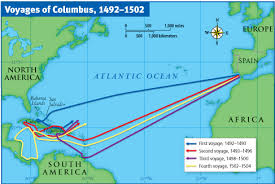WHILE READING about things totally unrelated to the counterjihad
movement, I have occasionally come across some interesting historical
facts about Islam. I was surprised to discover that Islam had a hand in
many important historical events I already knew about without ever
knowing Islam had anything to do with them. Here are a few of the most
interesting:
1. The creation of the U.S. Marine Corps was initiated in response to
Islamic warriors. The Barbary Coast pirates were following in
Mohammad’s footsteps, raiding caravans (in this case, oceangoing ships),
taking slaves, capturing people to hold for ransom, and demanding
“protection money” from any kafirs who didn’t want to be raided. This
had been going on for centuries along the North African Mediterranean
coastline.
So Thomas Jefferson did something every leader of the free world
should do: He bought himself a Koran and read it. Then when he became
president, he knew what he needed to do: He formed the United States
Navy, created the Marine Corps, and sent them to the shores of Tripoli,
where they soundly defeated the Muslim warriors.
This was the first foreign war fought by the United States. America’s
victory was the beginning of the end of the “Barbary Coast Pirates.”
The military aggressiveness of Islamic countries remained contained and
weakened for over a century.
2. The New World was discovered because of Islam. Christopher
Columbus was looking for a new trade route to the East. But why was he
looking for a trade route?
During the Second Jihad, Islam invaded Central Asia and defeated
Constantinople in 1453, cutting off the overland route for Europeans.
Islamic armies continued their jihad northward, and conquered much of
what is now Eastern Europe, until they were finally stopped at the gates
of Vienna in 1683. (Read more: The Second Major Wave of Jihad: the
Turks, 1071-1683.)
Europe had been trading with the Far East for centuries, and their
old overland route now went through territory that was hostile and
dangerous to anybody but Muslims. The economy of Europe was threatened.

So, in 1492, the year Islam was finally defeated in Spain, ending
Islam’s 780-year occupation, Columbus set off to find a passage to the
Far East by boldly sailing West into the unknown. Desperate times call
for desperate measures.
3. The .45 caliber 1911 semiautomatic pistol was created to stop
Islamic warriors. From 1902 until 1913, the United States fought a war
with the “Moro Warriors” in the Philippines. These Islamic warriors were
named “Moros” by the Spanish. Their unstoppability was legendary. “In
one instance,” writes Robert Boatman, “a Moro warrior received 14 bullet
wounds in five minutes, three of which penetrated his brain, and yet he
fought on.”
At the time the army was using .38 caliber guns, which were unable to
stop the Moros, so in 1906, they began testing different guns to find
something better. In 1911, they chose the .45 caliber semiautomatic
pistol. It had enough stopping power to kill even a Moro warrior with
one shot.
4. The Great Pyramid of Giza looks unfinished because of Muslims. The
pyramid was once covered by a smooth, beautifully polished layer of
white stone. This outer layer was removed by Muslims, who used the white
stone for mosques and palaces, leaving the ancient pyramids with their
somewhat unfinished appearance.
The physicist, John Zajac, wrote: “This protective covering was made
up of…hard, white limestone, similar to marble but superior in hardness
and in durability against the elements…The casing stones, 144,000 in
all, were so brilliant that they could literally be seen from the
mountains of Israel hundreds of miles away…The people of the area had
viewed the pyramid and its polished stones with awe for centuries. But
when a 13th century earthquake loosened some of these casing stones, the
Arabs recognized a great quarry of precut stones that could be used to
finish off palaces and mosques. For instance, the casing stones were
used to rebuild the new city of El Kaherah plus Cairo mosques and
palaces, including the Mosque of Sultan Hasan.”
Historically, this is Islamic standard operating procedure. Wherever
Islam established itself throughout the world, it destroyed or defaced
monuments that represented the previous (conquered) culture and replaced
it with Islamic structures and mosques. Afghanistan used to be
Buddhist. Turkey used to be Christian. Pakistan used to be Hindu. The
former cultures and any symbols of them were annihilated and replaced by
Islam.
The different nations of Europe were largely competitors with each
other. They were not a united force — far from it — but the Pope thought
he could unify Europeans if he made it a matter of “defending
Christians,” so that’s how he made his appeal. It helped unite Europeans
against a common threat, and it may have saved Europe from the forcible
Islamization suffered by the nations of the Middle East, part of India,
and North Africa. Read more: What About the Crusades?
Here’s another interesting historical tidbit about Islam’s influence:
The defense of Europe during the Crusades was devastatingly expensive,
and the Church of Rome tried many ways to raise funds. Some of these
fundraising efforts were deeply offensive to Martin Luther, so he
intitiated the Protestant Reformation.
Islam has had a profound impact on important historical events throughout its history, and it is still being felt today.
source
source




No comments:
Post a Comment